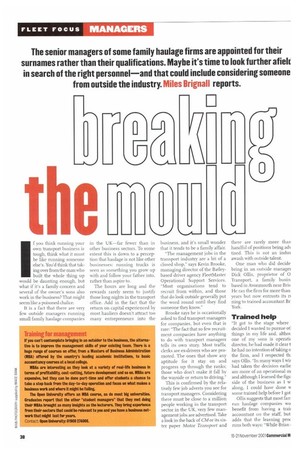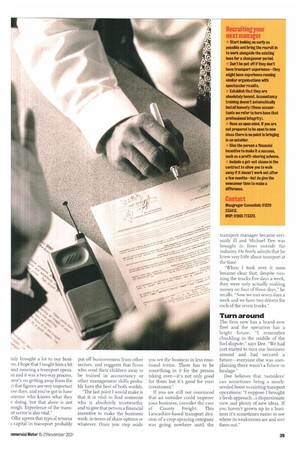f you think running your own transport business is tough,
Page 38

Page 39

If you've noticed an error in this article please click here to report it so we can fix it.
think what it must be like running someone else's. You'd think that taking over from the man who built the whole thing up would be daunting enough, but what if it's a family concern and several of the owner's sons also work in the business? That might seem like a poisoned chalice.
It is a fact that there are very few outside managers running small family haulage companies in the UK—far fewer than in other business sectors. To some extent this is down to a perception that haulage is not like other businesses: running trucks is seen as something you grow up with and follow your father into, rather than aspire to.
The hours are long and the rewards rarely seem to justify those long nights in the transport office. Add in the fact that the return on capital experienced by most hauliers doesn't attract too many entrepreneurs into the business, and it's small wonder that it tends to be a family affair.
"The management jobs in the transport industry are a bit of a closed shop,says Kevin Brooke, managing director of the Batleybased driver agency FleetMaster Operational Support Services. "Most organisations tend to recruit from within, and those that do look outside generally put the word round until they find someone they know."
Brooke says he is occasionally asked to find transport managers for companies, but even that is rare: "The fact that so few recruitment companies have anything to do with transport managers tells its own story. Most traffic clerks are ex-drivers who are promoted. The ones that show any aptitude for it stay on and progress up through the ranks; those who don't make it fall by the wayside or return to driving."
This is confirmed by the relatively few job adverts you see for transport managers. Considering there must be close to a million people working in the transport sector in the UK, very few management jobs are advertised. Take a look in the back of CM or its sister paper Motor Transport and there are rarely more than handful of positions being ach tised. This is not an indus awash with outside talent.
One man who did decide bring in an outside manage] Dick 011is, proprietor of 0 Transport, a family busirt based in Avonmouth near Bris He ran the firm for more than years but now entrusts its n ning to trained accountant Br York.
Trained help
"It got to the stage where decided I wanted to pursue ot1 things in my life and, althca one of my sons is operatic director, he had made it clear t he had no intention of taking the firm, and I respected th, says 011is. "In many ways I vvi: had taken the decision earlie am more of an operational in and although I learned the figu side of the business as I w along, I could have done v‘ some trained help before I got 011is suggests that most farr run haulage companies wo benefit from having a trail accountant on the staff, but adds that the learning proc runs both ways: "While Brian
inly brought a lot to our busi!ss, I hope that I taught him a bit out running a transport opera>n and it was a two-way process. iere's no getting away from the ct that figures are very important ese days, and you've got to have tneone who knows what they e doing, but that alone is not lough. Experience of the transirt sector is also vital."
Ohs agrees that typical returns capital in transport probably put off businessmen from other sectors, and suggests that firms who send their children away to be trained in accountancy or other management skills probably have the best of both worlds.
"The last point I would make is that it is vital to find someone who is absolutely trustworthy, and to give that person a financial incentive to make the business work, in terms of share options or whatever. Once you step aside you see the business in less emotional terms. There has to be something in it for the person taking over—it's not only good for them but it's good for your investment."
If you are still not convinced that an outsider could improve your business, consider the case of County Freight. This Lancashire-based transport division of a crop-spraying company was going nowhere until the transport manager became seriously ill and Michael Dee was brought in from outside the industry. He freely admits that he knew very little about transport at the time.
"When I took over it soon became clear that, despite running the trucks five days a week, they were only actually making money on four of those days," he recalls. "Now we run seven days a week and we have two drivers for each of the seven trucks."
Turn around
The firm now has a brand new fleet and the operation has a bright future. "I remember chuckling in the middle of the fuel dispute," says Dee. "We had just started to turn our business around and had secured a future—everyone else was complaining there wasn't a future in haulage."
Dee believes that 'outsiders' can sometimes bring a muchneeded boost to existing transport operations: "I suppose I brought a fresh approach.. .a dispassionate view and plenty of new ideas. If you haven't grown up in a business it's sometimes easier to see where its weaknesses are and sort them out."




























































































































































